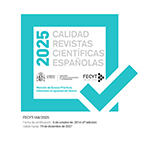Presidencias de comisión e institucionalización de la Cámara de Diputados en México (1997-2018)
Resumen
El presente artículo estudia la selección de presidentes de comisión como indicador sustantivo de institucionalización parlamentaria. El caso de estudio seleccionado para llevar a cabo dicho análisis es la Cámara de Diputados de México durante los 21 años de congresos no mayoritarios (1997-2018). Esta asamblea resulta apropiada para cuestionar los preceptos tradicionales de la teoría informativa dado el impedimento para la reelección inmediata de sus miembros y la carencia de instituciones que recompensen la experiencia de los representantes con cargos jerárquicos en comisiones. Mediante una base de datos propia con información biográfica, institucional, partidista y electoral de los 3,841 congresistas federales que ocuparon un asiento en la asamblea entre 1997 y 2018, y a partir de modelos logísticos de efectos condicionados, los resultados sugieren que tanto la experiencia parlamentaria de los legisladores como la adquisición de conocimientos en áreas particulares de política pública en espacios alternos al congresional, adquirieron cada vez más relevancia como factores definitorios para el acceso a presidencias de comisión.
Descargas
Descarga artículo
Licencia
La revista Política y Sociedad, para fomentar el intercambio global del conocimiento, facilita el acceso sin restricciones a sus contenidos desde el momento de su publicación en la presente edición electrónica, y por eso es una revista de acceso abierto. Los originales publicados en esta revista son propiedad de la Universidad Complutense de Madrid y es obligatorio citar su procedencia en cualquier reproducción total o parcial. Todos los contenidos se distribuyen bajo una licencia de uso y distribución Creative Commons Reconocimiento 4.0 (CC BY 4.0). Esta circunstancia ha de hacerse constar expresamente de esta forma cuando sea necesario. Puede consultar la versión informativa y el texto legal de la licencia.











